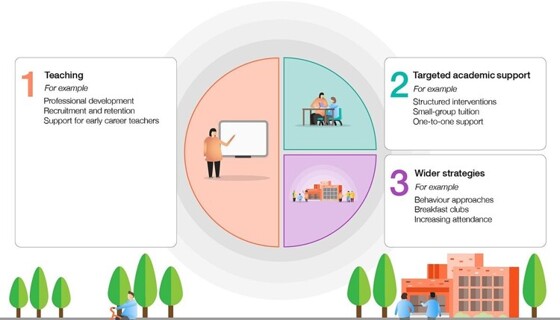
Posted on 20 Jun 2025
Farewell Year 11
Posted on 20 Jun 2025
Farewell Year 11
Read full article
Pupil Premium grant is additional funding allocated to schools by the Government for 2 separate objectives:
Funding is based on the number of pupils on roll recorded as:
PP grant funding is also allocated directly to the local authority for the number of pupils on roll recorded as:
The portion of PP grant funding for LAC and PLAC pupils is referred to as ‘pupil premium plus’ (PP+). The portion of PP grant funding for SC pupils is referred to as ‘service pupil premium’ (SPP).
How should schools use the Pupil Premium grant funding?
Pupil premium is not a personal budget for individual pupils, and schools do not have to spend pupil premium so that it solely benefits eligible pupils. Schools may use a portion of PP grant funding to support pupils who do not meet any of the PP grant eligibility criteria above where they deem it beneficial to do so. For example, PP grant can be used to support other pupils with identified needs, such as pupils who have or have had a social worker, or pupils who act as a carer. It can also be used for whole class approaches, for example high-quality teaching, which will also benefit non-disadvantaged pupils.
To ensure PP grant is focused on effective approaches to raising the educational attainment of eligible pupils, schools must use their PP grant in line with the ‘menu of approaches’ set by the Department for Education (DfE) developed in line with the Education Endowment Foundation’s (EEF’s) 3-tiered approach to help schools allocate spending across the following 3 key areas:

In line with the EEF’s recommended approach, schools should particularly prioritise funding to high-quality teaching, and reading and maths - which are the cornerstones of a broad, academic, knowledge-rich curriculum. Schools publish their Pupil Premium strategy statement annually by 31 December. In line with the EEF’s recommended approach, schools should particularly prioritise funding to high-quality teaching, and reading and maths - which are the cornerstones of a broad, academic, knowledge-rich curriculum. Schools publish their Pupil Premium strategy statement annually by 31 December.
Current Pupil Premium Strategy
For LAC, it is the responsibility of the local authority Virtual School Head, in consultation with the child’s school, to ensure that PP grant is used to support the child’s educational needs, in accordance with their personal education plans.The primary purpose of SPP is to enable schools to offer pastoral support to eligible pupils during challenging times and to help mitigate the negative impact of family mobility or parental deployment on service children. It can be used to help improve the academic progress if schools deem this to be a priority.
Further information from the DfE (2023/24) can be found on the following websites:
Pupil premium 2023-24: conditions of grant for local authorities - GOV.UK (www.gov.uk)
Using pupil premium: guidance for school leaders (publishing.service.gov.uk)
How can I get support for my child?
Eligibility for Free School Meals:
A child is eligible for free school meals if their parent/carer (or the child themselves) receives any of the following benefits:
Please apply direct on the Cornwall Council website or use the form below.
Free School Meals Application via Cornwall Council WebsitePrintable FSM Application Form
Re-Loved Uniform Shop:

We have limited stock of pre-loved uniform items for sale or swap, priced based on suggested donation. Donations of second hand uniform are always welcomed.
There is a Redruth re-loved event at the end of every school term, plus an additional Prom re-loved event once a year.
If you would like to view our pre-loved stock between these events, the Re-Loved shop is open every Friday 2pm to 3.30pm or please contact enquiries@redruth.cornwall.sch.uk to make an appointment outside of these times.
Funding for new uniform, school equipment or trips:
An allocation of £30 per pupil is reserved for students registered as Pupil Premium to support the purchase of uniform, school equipment or towards the cost of trips and visits.
If you require support with any of the above, please contact Mrs King: jking@redruth.cornwall.sch.uk or call 01209 203700.
Contact us

Mr Craig Bonds - Headteacher
Tolgus Vean, Redruth, Cornwall, TR15 1TAUpdate your browser to view this website correctly. Update my browser now
